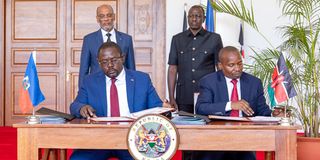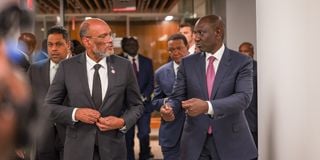Premium
Haitian prisoners escape as Kenya's opposition calls for review of police deployment plan

A demonstrator holds up a Haitian flag during a protest against Prime Minister Ariel Henry's government and insecurity, in Port-au-Prince, Haiti March 1, 2024.
What you need to know:
- Mr Cherizier has been sanctioned by both the UN for trying to overthrow the prime minister in the war-torn country.
- The Haiti's police union on Sunday called on all officers in the capital to help contain the situation at the prison.
As Kenya plans to send its police force to Haiti, the security situation in the Caribbean nation continues to deteriorate after hundreds of prisoners escaped in the capital Port-au-Prince on Sunday.
The prisoners escaped from the National Penitentiary in the capital after a fight broke out between forces loyal to Haitian Prime Minister Ariel Henry and gang leader Jimmy Cherizier.
Mr Cherizier, a former police officer, has been sanctioned by both the United Nations and the US Treasury Department for trying to overthrow the prime minister in the war-torn country.
Haiti's police union on Sunday called on all officers in the capital to help contain the situation at the prison, saying the escape spelt doom for the country's security.
"We are finished. No one will be spared in the capital because there will now be 3,000 extra bandits," said the statement posted on X on Sunday.
In what appears to be a well-thought-out strategy, the country has seen a surge in unrest since last Thursday, with police stations, the international airport and the national prison being targeted in a manner unprecedented in recent years.
Gunfire near the airport on Thursday last week forced airlines to suspend flights.
The US Embassy in Haiti issued a security alert on Friday, warning of gunfire and traffic disruptions near the domestic and international terminals and surrounding areas, including a hotel and the Central Directorate of Judicial Police.
Warring gangs control much of Port-au-Prince, cutting off vital supply lines to the rest of the country. Gang members have also terrorised the population of the capital, forcing more than 300,000 people to flee their homes.

A masked man calls on demonstrators to stop during a protest against Prime Minister Ariel Henry's government and insecurity, in Port-au-Prince, Haiti March 1, 2024.
The insecurity comes as Kenya plans to send 1,000 police officers to Haiti as part of a UN-backed multinational security mission to help the Haitian government reclaim territory from the gangs.
Signed an agreement
On January 29, Justice Enock Chacha Mwita ruled that the government's decision to send police officers to Haiti violated the constitution, describing it as unconstitutional, illegal and invalid because there was no framework between the two countries.
In an act of defiance, Interior Cabinet Secretary Kithure Kindiki and his Haitian counterpart signed an agreement at State House on Friday, paving the way for the deployment.
While in Kenya last week, Mr Ariel expressed confidence that peace would be restored in his country despite the intensifying conflict between the government and violent gangs.
Speaking at a public lecture at the United States International University (USIU) in Kenya on Friday, Mr Ariel thanked Kenya for its solidarity with the people of Haiti and for agreeing to help address the security situation in the country.
With the security situation deteriorating, the Kenyan policemen on the mission have an uphill task as gangs have taken control of most parts of the country.
In January alone, some 1,100 people were killed, injured or kidnapped in what the UN called the most violent month in two years of instability.
Without a democratically elected leader, Haiti has not known peace since the assassination of President Jovenel Moise in 2021.
Under an earlier agreement, Mr Ariel had promised to hold elections and transfer power by 7 February. He has since backtracked and moved the election date to August 31, 2025.
At the same time, Kenya’s opposition in Parliament is asking for a ‘review’ of Nairobi’s decision to deploy police troops to Haiti, even as the entire programme still relies on a court verdict yet to be delivered.
Kenya has vowed to deploy some 1000 police officers to Haiti and last week went ahead to sign a bilateral ‘reciprocal’ instrument with Haiti.
But the move came as Haitian gangs took over most of the capital Port-au-Prince including the airport, to prevent Prime Minister Ariel Henry from returning to his country from a trip in Nairobi. Dr Henry was expected to arrive on Sunday, having left Nairobi on Friday night, according to local Haitian media outlets.
The entire programme, though, has been controversial ever since the UN Security Council endorsed the Multinational Security Support (MSS) Mission to Haiti, to be led by Nairobi. Several other countries including Benin, Spain, Senegal, Jamaica, Antigua Bermuda and the Bahamas were listed as having volunteered to send personnel too. Mongolia and Belize have also expressed support while Canada has pledged to join the US in fundraising for the Mission.
Suicide mission
Its entire cost, however, remains unknown given the actual number of personnel and their needs are still being worked out.
In Kenya, the National Assembly Minority leader Opiyo Wandayi who had opposed the planned deployment in parliament when the request was tabled for approval, says the deal signed between Nairobi and Port-au-Prince on Friday is a suicide mission.

President Ruto and Haiti PM Ariel Henry witnessed the signing ceremony in State House Nairobi.
He has now appealed to President Ruto to rethink, review and rescind this decision because the country is likely to suffer immense losses.
He spoke in Siaya on Saturday, saying the bilateral instrument, in fact, lacked legal backing.
“More critically, as we speak, there is no legitimate government in Haiti. So whoever came here calling himself the Prime Minister is not legitimate and therefore the Haiti government as we speak has got no legal capacity to enter into any contractual obligation with any other country, either bilaterally or multilaterally,” faulted the Ugunja MP, also the Minority Leader in the National Assembly.
“I saw some protocol being signed at State House yesterday (Friday) between the Kenyan government and the government of Haiti. As per the recent court order and judgment, we are yet to meet the basic conditions.”
Mr Wandayi argued that there is the question of reciprocity and it is not just a call for signing of papers.
“We must prove that the Haitian law has similar provisions as the Kenyan law as far as the participation of Kenyan officers outside the country is concerned,” he stated. The Haitian Constitution does not require reciprocity for troops to be deployed on its land. It gives the executive powers to endorse such arrangements.
Except that Haiti hasn’t had an elected government since President Moïse, the 43rd president of the country, was assassinated on July 7, 2021. Moïse himself had overstayed his welcome, having overrun his term in 2016.
Henry’s tenure was supposed to be a temporary installation to plan for elections. But he has delayed the polls thrice now, promising to deliver the vote by mid-next year. The gangs in his country rejected the delay and had warned him last week not to return to the country.

President William Ruto and Haitian Prime Minister Ariel Henry at State House, Nairobi on Friday.
The opposition leader in parliament said the whole scenario paints a bleak picture for Kenyan police. They have, on one side, been welcomed by business communities and the temporary government. But they have been warned by the gangs controlling most of the Haitian capital.
“The power of warning, if they can declare their own “PM” persona non grata, what of our helpless police officers? Who will be leaving here in their thousands to go to Haiti, they don’t even speak English, let alone Kiswahili, how will these our children survive in Haiti? “he questioned.
“What is in it for the Kenyan government to insist on taking the police officers to Haiti, is it pressure from outside or mere pursuit of money? So it is not yet too late, I want to appeal to President William Ruto to rethink and rescind this decision because we are likely as a country to suffer untold losses.”
Kenya plans to send officers including specialised units from the Rapid Deployment Unit, Anti Stock Theft Unit, General Service Unit, and Border Patrol Unit.
But must navigate the legal landmines. When Kenya first agreed to the deployment request from the US, some Kenyans sued challenging the legality of the move. Kenya says it is sending police out of an international obligation to contribute to peace and stability. But critics say there is no immediacy and that in fact there are more pressing security problems in Kenya such as banditry, and in the wider neighbourhood of Africa, which Kenya should prioritise.
The High Court ruled that the Kenyan cannot send police troops as it requires a bilateral agreement with the receiving state. President Ruto argued on Friday the reciprocal instrument will cure the gap. However, Kenya cannot use the instrument in the Court of Appeal to argue its case because the Court of Appeal will only assess the evidence tabled in the High Court to assess whether that verdict should be reversed.
The government will still need to table the agreement in parliament for ratification too, as is tradition.
Mr Henry jetted into the country after the 46th Ordinary Meeting of Caribbean Community (Caricom) Heads of State and Government held in Guyana on February 28.
Gang violence has made ordinary life difficult. The UN documented some 4,789 people killed by gang violence in Haiti last year, a 119 percent increase from 2022, and that another 3,000 were kidnapped.
The MSS is supposed to help patrol streets, secure installations like airports and train local police.






